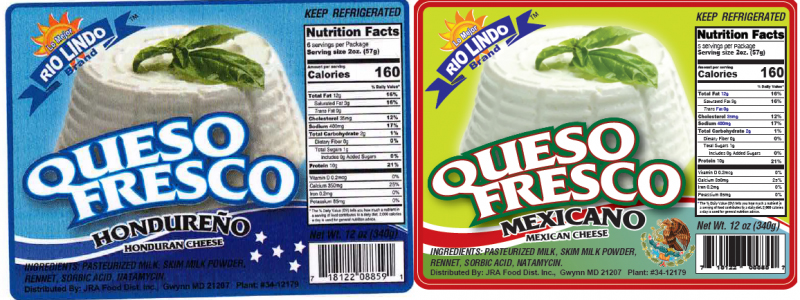–UPDATE March 9, 2021 — Today the FDA confirmed that the recalled cheeses were also distributed to Rhode Island. “States with confirmed distribution now include: AL, CT, FL, GA, IA, IL, IN, KS, KY, MA, MD, MI, MN, MO, MS, NC, NJ, NY, NE, OH, PA, RI, SC, TN, VA, and WI.”
–UPDATE February 24, 2021 — FDA has expanded its warning related to El Abuelito Cheese to include all cheese branded by the company “until more information is known”.
—END UPDATE—
A multistate outbreak of Listeria monocytogenes has been linked to Hispanic-style fresh and soft cheeses produced by El Abuelito Cheese, Inc. As a result, the company has recalled all Questo Fresco products with sell by dates through March 28 (032821).
Join Food Safety Tech on April 15 for the complimentary Food Safety Hazards Series: Listeria Detection, Mitigation, Control & Regulation“As the FDA stated, about this outbreak investigation, the Connecticut Department of Public Health collected product samples of El Abuelito-brand Hispanic-style fresh and soft cheeses from a store where a sick person bought cheeses. Sample analysis showed the presence of Listeria monocytogenes in samples of El Abuelito Queso Fresco sold in 10 oz packages, marked as Lot A027 with an expiration date of 02/26/2021,” the company stated in an announcement posted on FDA’s website. “Samples are currently undergoing Whole Genome Sequencing (WGS) analysis to determine if the Listeria monocytogenes found in these samples is a match to the outbreak strain. At this time, there is not enough evidence to determine if this outbreak is linked to El Abuelito Queso Fresco.”.
The recalled products were distributed to Connecticut, Maryland, New Jersey, North Carolina, New York, Pennsylvania and Virginia. Thus far seven people, all of whom have been hospitalized, have fallen ill.
FDA recommends that consumers, restaurants and retailers do not consume, sell or serve any of the recalled cheeses. The agency also states that anyone who purchased of received the recalled products use “extra vigilance in cleaning and sanitizing any surfaces and containers that may have come in contact with these products to reduce the risk of cross-contamination.”



